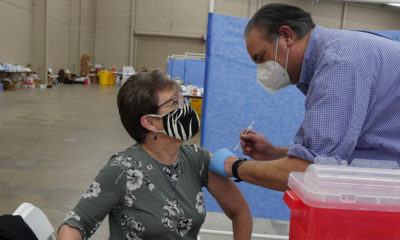AP News
2nd COVID-19 Vaccine Gets Public Review Ahead of US Decision
Published
4 years agoon
By
AP News
WASHINGTON — A second COVID-19 vaccine moved closer to joining the U.S. fight against the pandemic Thursday as government advisers convened for a public review of its safety and effectiveness.
It’s the next-to-last step for the vaccine developed by drugmaker Moderna and the National Institutes of Health. The panel of physicians and medical researchers is expected to endorse it, followed by the Food and Drug Administration’s OK within hours or days.
The action would provide a boost to the largest vaccination effort in U.S. history that kicked off this week. More shipments of the first green-lighted vaccine, developed by Pfizer and BioNTech, were going out Thursday, earmarked for health care workers and nursing home residents around the country.
A second vaccine is urgently needed as coronavirus infections, hospitalizations and deaths continue to rise in the U.S. ahead of holiday travel and gatherings that are expected to further fuel the pandemic.
The FDA’s Dr. Doran Fink opened the daylong meeting reiterating that the agency’s review would be “transparent, scientifically sound and data-driven.”
Moderna’s vaccine is largely following the same path as Pfizer-BioNTech’s, which relies on the same groundbreaking technology. Most traditional vaccines use dead or weakened virus, but both of the new vaccines use snippets of COVID-19’s genetic code to train the immune system to detect and fight the virus. Both require two doses, weeks apart.
The rapid development of two highly effective vaccines using the novel technique is one of the scientific triumphs in the race against coronavirus.
“This is coming much faster than what anybody thought,” said Dr. Jesse Goodman, of Georgetown University, former chief of the FDA’s vaccine division. “Something that might have otherwise taken several years — to take this new vaccine technology and test it and approve it — was compressed into within a year.”
A Speedy FDA Ruling Seems Almost Certain
But he added both vaccines have only been studied in volunteers for a few months and more follow-up is needed to answer important questions, such as how long protection lasts.
A speedy FDA ruling seems almost certain after the agency issued a positive review Tuesday confirming the Moderna shot’s safety and effectiveness. Either way, Moderna’s vaccine will remain experimental as the company’s two-year study of 30,000 people continues.
In scrutinizing early results of the study, the FDA found the vaccine was more than 94% effective overall at preventing COVID-19. No major safety problems appeared. Side effects typically seen with vaccinations were common, such as fever, fatigue and muscle aches.
If authorized by the FDA, U.S. officials said the initial shipment of nearly 6 million doses would go to health workers and nursing homes. The new vaccine needs to be stored at regular freezer temperatures, but not the ultra-cold required for Pfizer-BioNTech’s shot.
The independent review by FDA’s vaccine panel is considered key to easing public skepticism about the safety of the vaccine. The panel is likely to debate guidance for key groups who could face greater risk or uncertainty, such as pregnant women.
While pregnant women were excluded from Moderna’s study, FDA reviewers noted 13 new pregnancies among participants after the study got underway. The impact of the vaccine on those pregnancies is “unknown at this time,” the FDA review found.
If FDA follows the course it did with the Pfizer-BioNTech vaccine, pregnant women would be told to consult their doctor first. The vaccine was also not studied in children, and would only be authorized for people 18 and older. Pfizer’s shot was cleared for teenagers 16 and up.
Britain Reported Two Serious Allergic Reactions
The panel is also likely to scrutinize Moderna’s data for any hints of rare, serious allergic reactions.
On its first day of vaccinations with the Pfizer-BioNTech shot, Britain reported two serious allergic reactions among people who had a history of allergies so severe that they always carried EpiPens. And on Wednesday, officials in Alaska reported an allergic reaction in a health worker who had no known allergies to vaccines.
The FDA says the Pfizer-BioNTech vaccine can be given to anyone who doesn’t have a history of allergic reactions to one of its ingredients, such as polyethylene glycol, a chemical found in many drugs and foods.
The FDA found no severe allergic reactions in Moderna’s data but flagged a slightly higher rate of less serious hypersensitivity reactions among participants who got the vaccine, compared with those receiving a dummy shot.
Regulators also noted three cases of Bell’s palsy, which temporarily paralyzes facial muscles, among vaccine recipients, compared with just one among those getting a dummy shot. The FDA review said the role of shot in potentially triggering the cases in the vaccine group “cannot be ruled out.”
Similar cases were reported during the review of Pfizer’s vaccine. Ultimately, the FDA said it would carefully monitor the problem as the vaccine rolls out.
Assuming a positive panel vote, the FDA will face pressure to quickly grant approval, as it did last week when FDA commissioner Stephen Hahn was reportedly threatened with possible removal by the White House if the agency didn’t move fast enough.
Asked about the day’s events earlier this week, Hahn reiterated that “science and data” are guiding the agency’s decisions, a mantra he has repeated for months.
“We’re not going to let politics enter into this,” Hahn said in an online interview with the Journal of the American Medical Association. “This isn’t about me, it’s not about any individual, it’s about the American people.”
You may like
-


Tulare County Gang Member, Two Fresnans Head to Federal Prison
-


California Pins Vaccine Hopes on Biden Administration
-


Capitol Photos, Videos Lead to California Doctor’s Arrest
-


Vaccine Chaos: Californians Scramble for Shots Amid Mixed Messaging
-


AP-NORC Poll: Virus, Economy Swamp Other Priorities for US
-


Walters: California Still Lags Behind in Vaccinations











